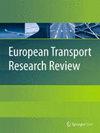The problem of homogeneity of rail passenger delay compensation scheme rules in Great Britain: impacts on passenger engagement and operator revenues
IF 4.2
3区 工程技术
Q1 TRANSPORTATION
引用次数: 0
Abstract
A rail passenger delay compensation scheme aiming at improving attractiveness of rail services and providing minimum customer service standards for delayed passengers operates in the European Union and Great Britain. British rail passengers are eligible to claim 50% of fare for delays of more than 30 min and 100% for delays of over 1 h. The scheme rules were chosen arbitrarily and are homogeneous across all ticket types and journey lengths. As longer journeys are usually more expensive and subjected to longer delays, long distance operators are likely to see more passengers being eligible to claim compensation. This, combined with higher engagement rates due to differences in sensitivity to lateness or opportunity cost of not claiming compensation is likely to have an impact on the differing revenue burden for operating companies. Against this background, this study aims to quantify the revenue impact of homogeneity of scheme rules for different types of train operators to advance understanding of the scheme’s costs and motivate further research into the economic rationale behind the scheme’s provision and design. An econometric model was constructed to empirically test the impact of performance levels and train operator characteristics on the compensation payments made to passengers through the ’Delay Repay’ scheme in Great Britain. The combined differences in the nature of operation and engagement levels mean that with delay levels and engagement increasing with journey length and fare, short, medium and long distance train operating companies (TOCs) repay on average respectively 0.3%, 0.8% and 1.8% of their ticket revenues, increasing the scheme’s proportionate burden on the revenues of long distance operators. Further research is needed to either explain the economic or regulatory reasons behind the differing revenue impact of the scheme on different types of TOCs or suggest how the scheme can be redesigned to take these differences into account.英国铁路乘客延误补偿计划规则的同质性问题:对乘客参与度和运营商收入的影响
旨在提高铁路服务吸引力并为延误乘客提供最低客户服务标准的铁路乘客延误补偿计划在欧盟和英国实施。英国铁路乘客有资格就 30 分钟以上的延误索赔 50%的票价,就 1 小时以上的延误索赔 100%的票价。该计划的规则是任意选择的,对所有车票类型和旅程长度都是一样的。由于较长的旅程通常费用更高,延误时间更长,长途运营商可能会看到更多乘客有资格索赔。这一点,再加上由于对延误的敏感度或不索赔的机会成本不同而导致的较高参与率,很可能会对运营公司的不同收入负担产生影响。在此背景下,本研究旨在量化不同类型列车运营商的计划规则同质性对收入的影响,以加深对计划成本的理解,并推动对计划提供和设计背后的经济学原理的进一步研究。我们构建了一个计量经济学模型,以实证检验英国 "延误补偿 "计划的绩效水平和列车运营商特征对乘客补偿金的影响。运营性质和参与程度的综合差异意味着,随着延误程度和参与程度随旅程长度和票价的增加而增加,短途、中途和长途列车运营公司(TOCs)平均分别偿还其票务收入的 0.3%、0.8% 和 1.8%,从而增加了该计划对长途运营公司收入的比例负担。需要进一步研究解释该计划对不同类型的隧道运营公司收入影响不同背后的经济或监管原因,或建议如何重新设计该计划以考虑到这些差异。
本文章由计算机程序翻译,如有差异,请以英文原文为准。
求助全文
约1分钟内获得全文
求助全文
来源期刊

European Transport Research Review
Engineering-Mechanical Engineering
CiteScore
8.60
自引率
4.70%
发文量
49
审稿时长
13 weeks
期刊介绍:
European Transport Research Review (ETRR) is a peer-reviewed open access journal publishing original high-quality scholarly research and developments in areas related to transportation science, technologies, policy and practice. Established in 2008 by the European Conference of Transport Research Institutes (ECTRI), the Journal provides researchers and practitioners around the world with an authoritative forum for the dissemination and critical discussion of new ideas and methodologies that originate in, or are of special interest to, the European transport research community. The journal is unique in its field, as it covers all modes of transport and addresses both the engineering and the social science perspective, offering a truly multidisciplinary platform for researchers, practitioners, engineers and policymakers. ETRR is aimed at a readership including researchers, practitioners in the design and operation of transportation systems, and policymakers at the international, national, regional and local levels.
 求助内容:
求助内容: 应助结果提醒方式:
应助结果提醒方式:


